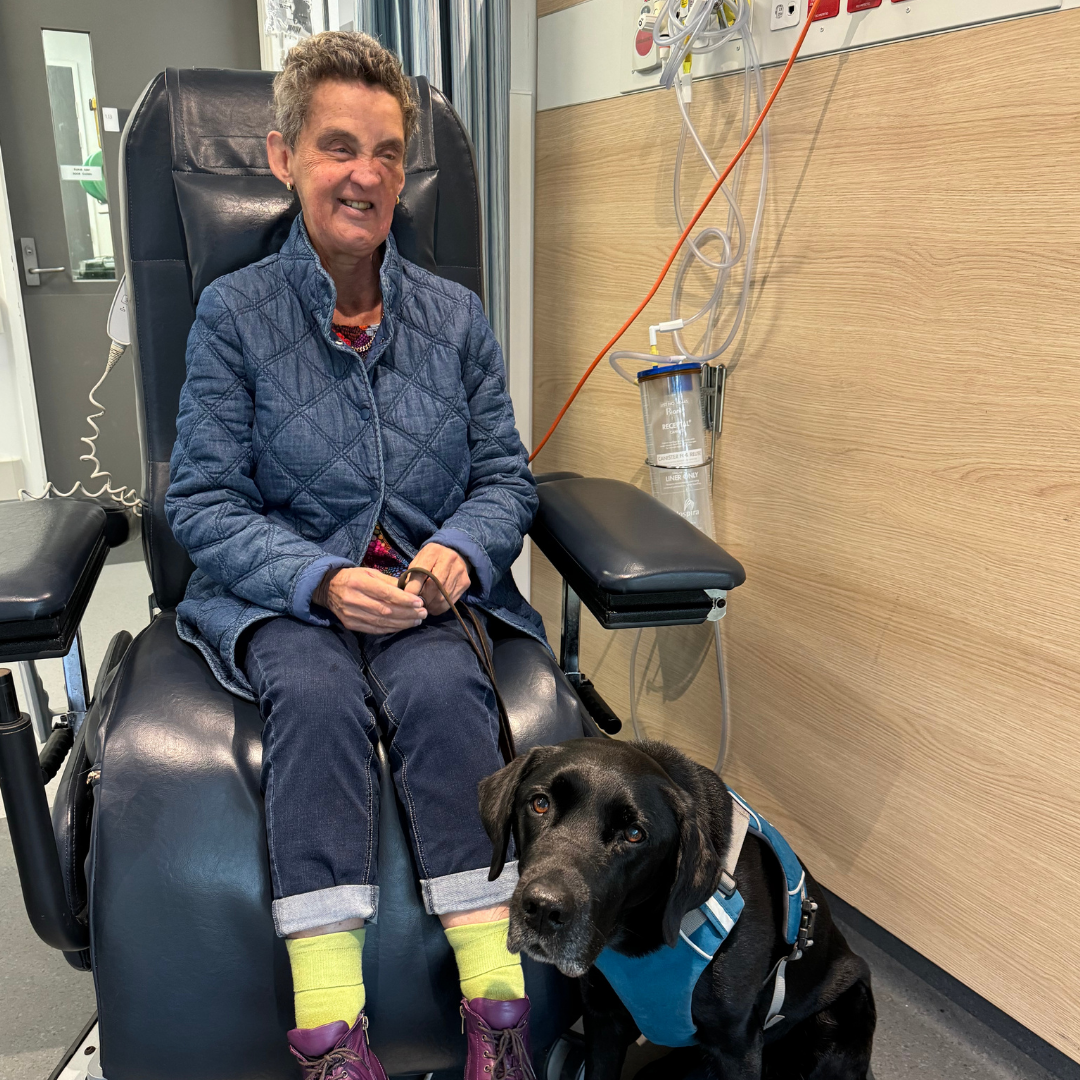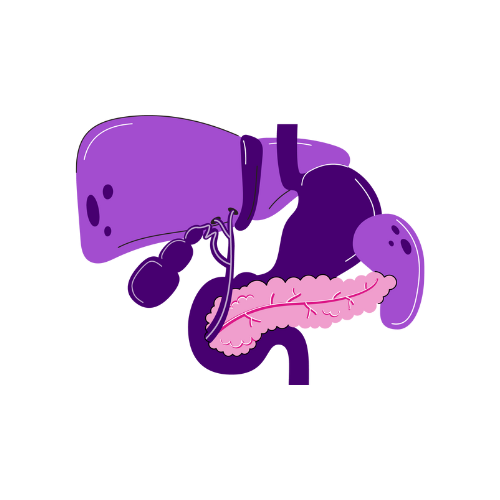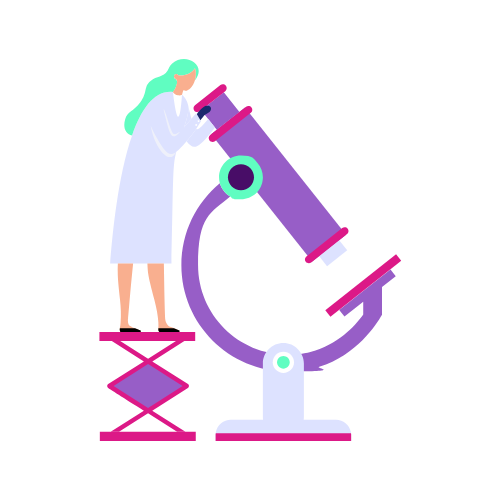Leanne's Story

Leanne's Story
Pancreatic cancer is a savage sinister disease, taking many peoples’ lives way too early. I was diagnosed with stage 3 advanced pancreatic cancer on May 8, 2023. My name is Leanne and this is my story.
At the time of diagnosis, the only symptom I had was abdominal discomfort, as if I had eaten a ten-course meal (when I had not) and it would not easily digest. Otherwise, I was quite fit and healthy, attending the gym twice a week, walking with my Guide Dog, Ester, more than 12000 steps per day.
In March 2023 I went to my GP to discuss the symptoms I was experiencing. I had been diagnosed with a stomach ulcer in 2019, so was referred to the specialist who had diagnosed and managed that for review. That specialist did not physically examine me nor order any ultrasounds or scans. They simply commenced me on oral medication and scheduled an endoscopy for early May, 5 weeks after this initial appointment. At this point in the specialist’s opinion, whatever was causing me discomfort wasn’t cause for immediate investigation.
I had reason to see my GP in April. He happened to ask me whether my abdominal discomfort had eased. I replied: “no; in fact, the symptoms seem to be worsening”. At this point my GP ordered an ultrasound which showed a shadow on my pancreas. I then had a CT scan which showed further signs that all was not right. I was then referred to a different specialist for an endoscopic ultrasound. This enables a biopsy to be taken direct from the pancreas. It was he who advised I had a pancreatic tumour about the size of an orange. I was shocked, in disbelief, thinking all I had was a stomach ulcer. Ironically a standard endoscopy cannot see through to the pancreas nor assist in guiding biopsies of a mass, only an endoscopic ultrasound can do this. Without my GP’s intervention, my pancreatic cancer would have gone undetected and therefore untreated, possibly costing my life. Unfortunately, pancreatic cancer is often only detected when at the advanced stage as few symptoms present before this.
Having been blind since birth, I have had lived experience in the medical system from a very young age. As a counsellor and social worker, I have worked alongside the medical system for many years. To this end, I know how to navigate the system, the importance of exploring all treatment options and the importance of seeking second opinions. So, following my diagnosis I immediately sought opinions from two top upper GI surgeons in Sydney. They both recommended beginning with 3 months of chemotherapy to try and shrink the size of the tumour, before surgery could be considered.
At the time of diagnosis, my cancer marker was 1124, which is very high. The chemotherapy was effective in reducing the size of the tumour, meaning that surgery became an option. Less than 20 percent of persons with stage 3 pancreatic cancer make it to surgery, so I was extremely lucky. However, it shows that far more research needs to be conducted to ensure early detection of this sinister disease.
In preparation for surgery, staff from Guide Dogs NSW/ACT provided me with orientation around the hospital environment. They also provided education and upskilling to all those involved in my care on how to best assist a patient who is blind or has low vision. This enabled me to feel safe and supported and gave nursing staff greater confidence in caring for me.
On 23 September I had major surgery to remove half my pancreas, my spleen, 1 adrenal gland, part of my small intestine and 36 lymph nodes. Recovery was lengthy and, well, at times rough. Just as I began to feel better, in November I had to begin 3 months of “mop up” chemo, the purpose of which was to try and capture any cancerous cells that had escaped into the lymphatic system. I finished “mop up” chemo at the end of January this year. My cancer markers remained low, and no evidence of recurrence could be seen. I was hopeful!
After surgery I was told my histopathology indicated that there was a 70 percent chance of the cancer recurring within two years and if it did, it would be “terminal”. A very sobering conversation to have to have! Chemotherapy is a funny thing in that it is a cocktail of somewhat poisonous toxic drugs going in to one’s system, but often is the very thing that keep’s one’s cancer at bay and, that means it keeps you alive!
Given chemotherapy had been effective, I asked my oncologist if I could go on “maintenance” chemo as a way of preventing further recurrence. The answer was a flat “no”, the reason being that there was no protocols or evidence for such.
One must wonder, whose agenda was driving my treatment plan. What about what I wanted?
I am a strong self-advocate and regularly advocate for vulnerable women in my work role as a senior caseworker on the NSW Domestic Violence Line. Yet at this time, I found myself in a conventional medical system where much about what is offered is based on established protocols and evidence only. I felt I had no voice, no say! Yet with these next two years being critical, I was still strongly fighting for my life. Where is the space for the patient’s voice and where is the consideration and inclusion of the patient’s wishes?
Over the next 3 months, in a time when I was to be healing and feeling better, my health began to significantly deteriorate. I lost a great deal of weight, I struggled with intense and relentless back pain and nausea. I was able to eat only very little.
I told my healthcare providers something was wrong. I felt I was not being listened to by my medical team. I know my body best and I knew something was wrong. Emotionally I hit rock bottom.
Because of my blindness, having had to overcome many challenges in life, I have always been incredibly resilient and strong. I had held on and fought for my life for some nine months, both physically and emotionally. Yet feeling so increasingly unwell, fatigued and not “being heard”, I began to lose the energy to fight to be heard and to receive the care I deep down knew was right for me.
At the beginning of March, I attended an Upper GI clinic; It was recognised then that my symptoms may indeed be reflective of a physical problem. My referrals for scans were marked urgent yet still I had to wait some 5 weeks for appointments. The scans showed blockages in my bile duct and a restricted sphincter muscle. Further surgery was required to rectify these issues.
At the same time my three-monthly CT scan showed a mass in my abdomen. Biopsies were taken and it was diagnosed as fibrous tissue: “good news, it is not cancer”. It was I who insisted on a PET scan to be sure. The PET scan in early May (almost a year to the day of diagnosis) showed recurrence of pancreatic cancer in my stomach and an inflamed nodule in my right lung.
“So sorry, your cancer has returned, and it is terminal”.
I have a prognosis at best, of one to two years. I am back on chemotherapy to try and reduce the size of the cancer, to minimise my symptoms and to give me some “quality of life” for as long as possible. A bittersweet pill to swallow! I can’t help but wonder, if I could have had maintenance chemo earlier, would my cancer have remained at stage 3? Would it have been held back and not spread to other parts of my body? Now I am “stage 4” and there is no chance of turning back. Trials and treatments may give me longer, but they will not save my life.
Chemo seems to be working thus far. My cancer markers are reducing and my symptoms lessening. I am still working full time. My energy levels are improving. I am able once again to enjoy long walks with my Guide Dog, Ester, and I am enjoying quality time with friends. I am planning to do those things I’ve long wanted to do.
My Guide Dog Ester is my rock; She is very in tune with me and seems to know that I am not well. She gives such unconditional love, devotion, joy, company, and comfort. She is incredibly proud of her guiding work which enables me to remain independent, moving about each day with safety and confidence. She is very precious and means the world to me. I am extremely lucky to have a strong network of friends supporting Ester and me. We could not have got through the last 12 months without them. And I know I will need them in the coming months more than ever.
One of the hardest things for me has been the complete lack of control I have over this cancer. I try not to look too far ahead right now. Rather, I take each day as it comes, one step at a time, doing all that I can to continue living a rich fulfilling meaningful life for as long as I am able. When I feel well, it is hard to imagine I am dying! Yet when I am unwell, death seems much closer. I find it hard to think about dying when I feel “alive”, but ironically when one is mentally and physically well, is the best time to begin planning for one’s death. As the saying goes: “Life can change in a heartbeat!” My cancer diagnosis certainly turned my life upside down. It has certainly been a roller coaster of a ride! If I could have one good thing come from sharing my story it is that more patients would learn to find their voice and speak their truth to the healthcare providers who are entrusted with their care and that, in turn, the medical people listen and truly hear and understand what patients are asking for.







